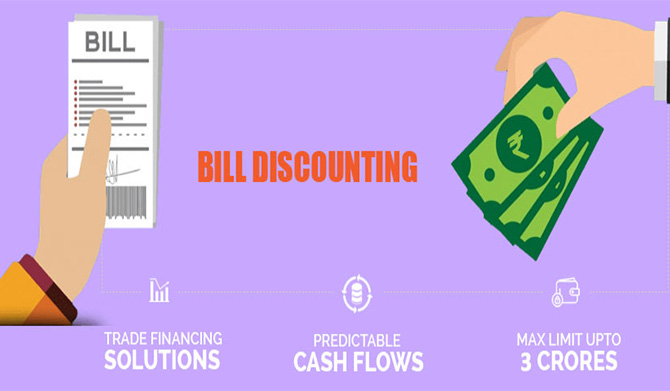- +91-8806060623
- info@finviscapital.com

Bill Discounting is a discount/fee which a bank takes from a seller to release funds before the credit period ends. This bill is then presented to seller's customer and full amount is collected. Bill Discounting is mostly applicable in scenarios when a buyer buys goods from the seller and the payment is to be made through letter of credit.
When a buyer buys goods from the seller, the payment is usually made through letter of credit. The credit period may vary from 30 days to 120 days. Depending upon the credit worthiness of the buyer, the bank discounts the amount that needs to be paid at the end of credit period. Bill Discounting is also known as Invoice Discounting.
It means that the bank will charge the interest amount for the credit period as an advance from the buyer’s account. After that, the bill amount is paid as per the end of the time span with respect to the agreed upon document between the buyer and seller.
Bill Discounting is a major trade activity. It helps the seller's get funds earlier on a small fees or discount. It also helps the bank earn some revenue. The borrower or (seller's) customer can pay money on the due date of the credit period.
Hence, this concludes the definition of Bill Discounting along with its overview.
The terms ‘invoice discounting’ or ‘bills discounting’ or ‘purchase of bills’ are all same. Invoice discounting is a source of working capital finance for the seller of goods on credit. Bill discounting is an arrangement whereby the seller recovers an amount of sales bill from the financial intermediaries before it is due. Such intermediaries charge a fee for the service. From the other side, it is a business vertical for all types of financial intermediaries such as banks, financial institutions, NBFCs, etc.
Invoice discounting can be technically defined as the selling of bill to invoice discounting company before the due date of payment at a value which is less than the invoice amount. The difference between the bill amount and the amount paid is the fee of the invoice discounting company. The fee will depend on the period left before payment date and the perceived risk. The bills or invoices under bill discounting are legally the ‘bill of exchange’. A bill of exchange is a negotiable instrument which is negotiable mere by endorsing the name. Our currency is a bill of exchange for example. Currency provides value written over it to the bearer of the instrument. In the case of bill discounting, such bills can be either payable to the bearer or payable to order. Therefore, after discounting a bill, a bank can further get the bill rediscounted from other banks in case of cash flow requirement.
The buyers and sellers of goods have conflicting objectives. The seller wishes to get paid immediately and the buyer wants as longer credit period as possible. Invoice discounting is the solution to the problem which creates a win-win situation. The seller gets his money almost instantly on payment of a small charge and is able to satisfy its customer with credit period. The invoice discounting is an easy way of getting finance. There are no hassles of sanctions etc.
A bank will look at the reputation of the seller as well as the past payment records of the buyer who needs to pay to the bank.
The bill has to be valid within the date of time permitted by customs for the bill date and its payment. This time period can vary from two weeks to two months. This time is called as “Usance Period”. Hence the bill should be a usance bill.
The transaction happens between banks where the confirming bank or the buyers’ bank does not intimate the seller of the reimbursement instruction but deals with his bank directly to determine the discounting terms.
There are two methods to present the bills to the buyer’s bank – with recourse and without recourse.
Along with recourse the seller’s bank checks all documents and terms of the discount and send it across to the buyer’s bank. This bank doesn’t need to recheck everything and can later claim refunds in case of any issues which crop up.
Without recourse bill of exchange is presented when there are no checks done by the seller’s bank and request for payment is done. The buyer’s bank will need to check all details. This is usually done when both banks have tie-ups for payment, acceptance, and negotiation from each other or the buyer’s bank has already confirmed on the discount terms
► The seller sells the goods on credit and raises invoice on the buyer. ► The buyer accepts the invoice. By accepting, the buyer acknowledges paying on the due date. ► Seller approaches the financing company to discount it. ► The financing company assures itself of the legitimacy of the bill and creditworthiness of the buyer. ► The financing company avails the fund to the seller after deducting appropriate margin, discount and fee as per the norms. ► The seller gets the funds and uses it for further business. ► On the due date of payment, the financial intermediary or the seller collects the money from the buyer. ‘Who will collect the money’ depends on the agreement between the seller and financing company.
The business gets the cash instantaneously giving business cycle a better momentum. It allows an entrepreneur to do business without funds. This works like a bank overdraft, the borrower pays the interest only on the amount of money utilized. There is a tough competition in the market to extend such credit and hence there are a plenty of different products to suit the needs of the client. There are borrowers who even cover the risk of bad debt along with the service. Obviously, the charge may be little more.